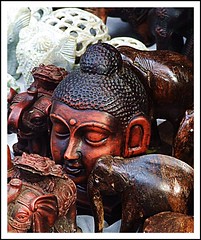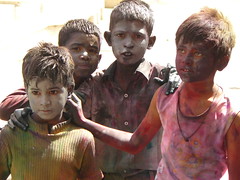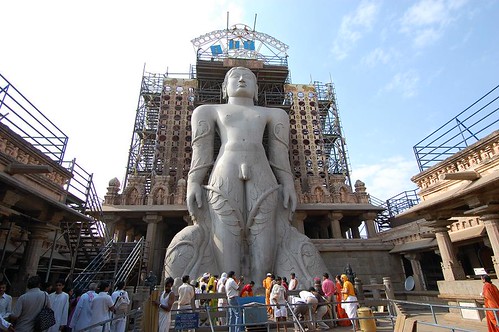This statue of Gomateshwara - Bahubali in Shravanabelagola, Karnataka, India - is carved from a single stone 57 feet high.
The giant image was carved in 981 A.D.
Bahubali is a major figure in Jain hagiography. His story exemplifies the inner strength of Indian culture. He won everything from his brother and could have become an emperor, but he returned everything to the brother. Bahubali is considered the ideal of the man who conquers selfishness, jealousy, pride and anger.
KARMA and reincarnation could be escaped through the willed elimination of ego and desire.
The story of Alexander the Great's encounter in India with "naked philosophers" may refer either to Hindus or Jains. Plutarch calls them Gymnosophists. Here is Arrian's version from his Campaigns of Alexander, circa 117 CE:
In Taxila once, Alexander met some members of the Indian sect of wise men whose practice it is to go naked, and he so much admired their powers of endurance that the fancy took him to have one of them in his personal train. The oldest man among them, whose name was Dandamis (the others were his pupils), refused either to join Alexander himself or to permit any of his pupils to do so.
"If you, my lord", Dandamis is said to have replied, "are the son of God, why -- so am I. I want nothing from you, for what I have suffices. I perceive, moreover, that the men you lead get no good from their world-wide wanderings over land and sea, and that of their many journeyings there is no end. I desire nothing that you can give me; I fear no exclusion from any blessings which may perhaps be yours. India, with the fruits of her soil in due season, is enough for me while I live; and when I die, I shall be rid of my poor body -- my unseemly housemate"
These words convinced Alexander that Dandamis was, in a true sense, a free man; so he made no attempt to compel him.
Subscribe to:
Post Comments (Atom)














0 comments:
Post a Comment